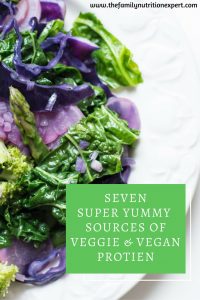 We all need to eat protein… it’s the building block of life! So, if you’re veggie or vegan, you need to make sure your diet is packed with a variety of plant protein, to ensure you’re getting enough amino acids in your diet.
We all need to eat protein… it’s the building block of life! So, if you’re veggie or vegan, you need to make sure your diet is packed with a variety of plant protein, to ensure you’re getting enough amino acids in your diet.
You won’t be getting enough protein in your diet if you simply stop eating meat, fish, eggs or dairy, and don’t look for other sources. Lots of vegetables and wholegrains are good for you, but you also need to consider your protein intake carefully.
Should meat eaters eat plant protein too?
Even if you are a meat eater, there are lots of reasons to enjoy meat-free meals on a regular basis. As well as being great for your health, it’s brilliant for your bank balance too! A kilogram of red lentils is under a £1 compared to an average price of £4.30 per kg for beef mince and £5.79 per kg for chicken breast * (and much more if you buy organic, which I always recommend you do). As a meat eater, I also use plant protein such as beans, lentils and tofu to bulk out my meals, meaning I need to use much less meat.
Why do we need protein?
Proteins are known as the building blocks of life: they break down into amino acids that promote cell growth and repair. (They also take longer to digest than carbohydrates, helping you feel fuller for longer – a plus for anyone trying to lose weight or who experiences energy swings and cravings.)
There are 20 different amino acids that can form protein and of those, nine that our bodies cannot produce on their own. These essential amino acids need to be included in the diet – otherwise our body cannot make them and also cannot absorb all the protein we eat. Luckily there are lots of delicious vegetarian and vegan friendly proteins to choose from, and by including different types of protein in your diet you can ensure you’re getting all the essential amino acids.
Vegetable protein sources are also packed with fibre, which is so important for our bowel health and good levels of beneficial gut microflora…. So a win-win all round!
Here are seven of my favourite sources of vegetarian and vegan proteins and some yummy ideas for how to use them!
Seven sources of vegetarian or vegan protein
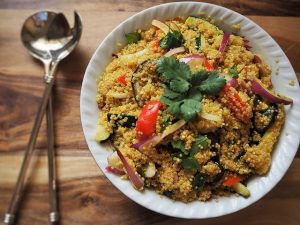 1. Quinoa
1. Quinoa
Most grains contain a small amount of protein, but quinoa (which is technically a seed) is unique in that it contains all nine essential amino acids that our bodies need for growth and repair. Toss it with vegetables and vinaigrette to make a refreshing summer salad. If you’re short on time, you can now buy it ready cooked in many supermarkets, from brands such as Merchant Gourmet and the Food Doctor.
Try this: Rainbow Quinoa Tabbouleh
2. Beans
There are many different varieties of beans – black, white, pinto, butter, kidney to name a few, each with their own taste and texture, but one thing they all have in common is their high amounts of protein. A delicious three-bean salad is one of my favourite lunches and my children just love my beany Bolognese!
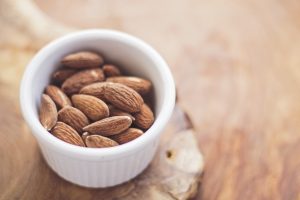 3. Nuts
3. Nuts
All nuts contain both healthy fats and protein, making them a valuable part of any plant-based diet. Did you know that around 6 almonds per day may help to reduce unhealthy cholesterol levels? Some varieties of nuts, especially cashews, are higher in carbs… so don’t overindulge. A handful or two per day is enough. Make sure you buy them raw, rather than the roasted or honey coated ones. I often carry a small bag of mixed nuts and seeds with me, they make a great sin-free snack if you’re feeling peckish on the go!
4. Nut and seed butters
Nut and seed butters are a great way to get more protein into your diet. And if you’re not a fan of peanut butter that’s not a problem! There are lots of delicious nut or seed butters available now, including butters made from almonds, pumpkin seeds, cashews, sunflower seeds, pecans, walnuts, and more. Skip any brand that contains hydrogenated oils or lots of added sugar. I like to add a dollop of nut butter to my morning smoothies to add extra protein, or some pumpkin seed butter onto my toast for an extra shot of protein as well as essential fats. My favourite brands are Meridian and Whole Earth in the UK
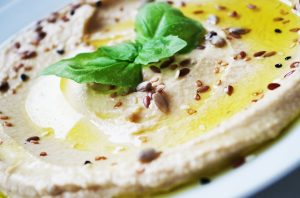 5. Chickpeas
5. Chickpeas
Most foods in the legume family are good sources of vegetarian protein, and chickpeas are no exception: Also known as garbanzo beans, chickpeas are high in fibre, calcium and other minerals, and low in calories. Toss them into salads, or puree them into a home-made hummus.
Try this: Pop a can of chickpeas in a blender with 1 clove of chopped garlic, ¼ cup of olive oil, 2 tablespoons of lemon juice and 2 tablespoons of tahini (another fab source of calcium). Add a pinch of salt and paprika, blend until smooth and you’re done! If the consistency is too thick add a little water until it’s just the way you like it!
6. Dark leafy greens
Vegetables may not boast the protein power of legumes and nuts, but dark leafy greens can certainly provide a powerful protein hit along with lots of antioxidants and heart-healthy fibre. Instead of lettuce, why not try a baby spinach, broccoli or kale salad? Or serve up plenty of cabbage, broccoli, Brussels sprouts with your main meals.
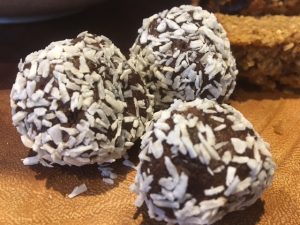 7. Unsweetened cocoa powder
7. Unsweetened cocoa powder
That’s right, you can in fact get a protein hit from chocolate! Unsweetened cocoa powder, I’m talking the type used in baking or making hot chocolate from scratch, can be used to jazz up lots of different snacks and smoothies. My children love it when I serve up a chocolate and banana smoothie!
Try this: Choco Protein Balls
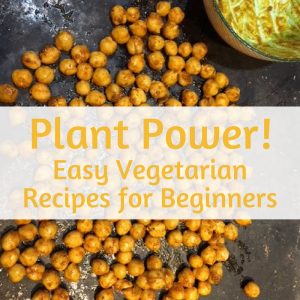
Are you curious about the benefits of a vegetarian or vegan lifestyle? If you fancy trying out a few meat-free meals before making a proper commitment I have the perfect way to dip your proverbial toe into a plant-based diet. Sign up for my totally FREE Plant Power 5-day Challenge and I’ll send you the first recipe straight away!